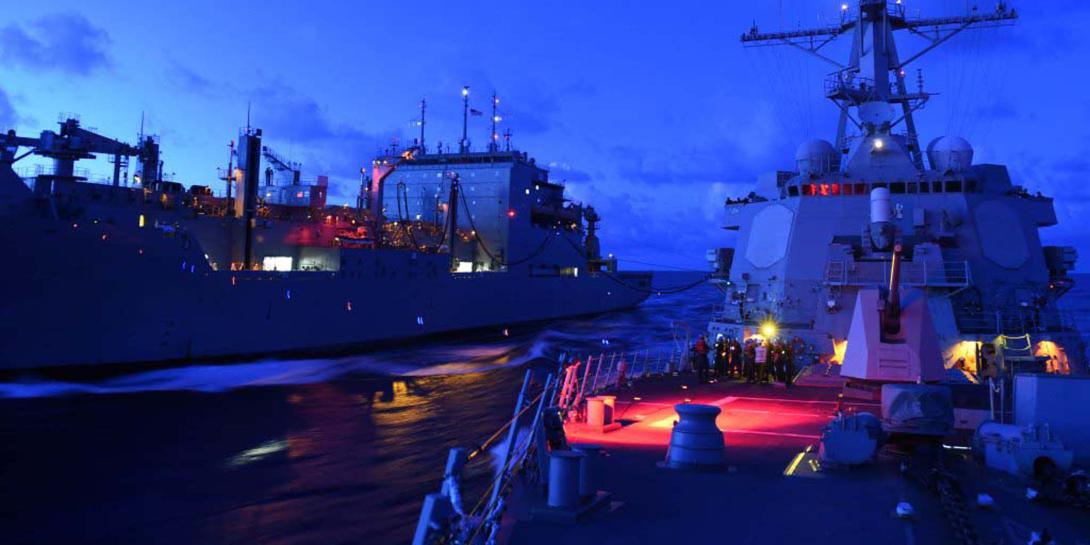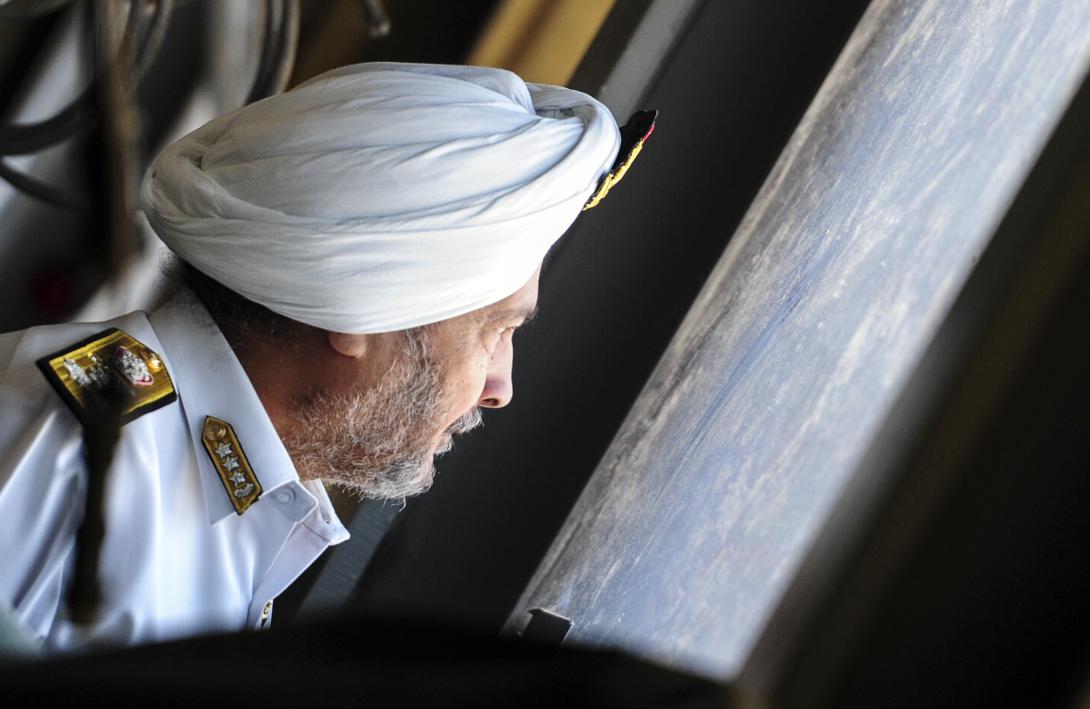New Partnerships Dominate Pacific Command Agenda
The U.S. Pacific Command is strengthening its international relationships among allies and friendly nations in the region as new threats begin to dominate the security agenda. Existing alliances are being improved and even expanded, and countries that have not worked with the United States in the past are finding common ground and increasing cooperative efforts across the vast Asia-Pacific region.
A variety of longtime threats recently has grown in intensity and potential consequence. The traditional concern of a regional brushfire conflict has evolved into a greater likelihood of a military confrontation that could harm peace and security throughout the region. The U.S. Pacific Command (PACOM), long involved in relationship building among the area’s diverse nations, now finds that activity the cornerstone of its attempts to counter threats that have become more serious in recent months.
Building strong relationships and working with allies, friends and partners is vital to maintaining success over an area comprising half the Earth’s surface, offers Adm. Harry B. Harris Jr., USN, PACOM commander. All the security challenges facing the command require a collective approach, he warrants.
This method helps PACOM meet what the admiral describes as its biggest challenge: North Korea and its quest for nuclear weapons and the means to deliver them intercontinentally. The North Korean threat, while real, is not currently an existential threat to the United States, he adds.
Nonetheless, the U.S. alliance with South Korea is critical to national interests, Adm. Harris declares. Working with Japan, the United States is building a “first of its kind” information-sharing arrangement with South Korea that will help the three countries collectively deter and respond to crises in that part of the region. “The U.S.-Japan alliance, in my opinion, is a critical component for the defense of South Korea—both in terms of deterring the North Korean threat and in Japan’s hosting of more than 50,000 U.S. troops dedicated to maintaining peace and security throughout the region,” he states. “It is important for the United States, Japan and South Korea to work together in a trilateral sense,” especially with regard to ballistic missile defense.
Constructive relations between Japan and South Korea—which Adm. Harris describes as “our most important relationships in Northeast Asia”—will extend security and prosperity throughout the region, he predicts. The three nations already share values such as democracy, free markets and a commitment to human rights, so they also need to share intelligence.
The admiral notes that North Korea is not the only challenge confronting the command. China is his most enduring challenge, he offers. The Middle Kingdom and its land reclamations built around contentious maritime claims in the South China Sea task PACOM. Russia is resurgent and has at least four strategic submarine, naval and air bases along its Pacific coast. With these challenges amid historical issues, “tactical actions can have strategic implications,” he warns.
To most Americans, China’s land reclamation may seem like a strange endeavor in a faraway place, the admiral offers. Yet China’s actions to enforce its territorial claims in the South China Sea—“which I have called preposterous in the past—could have far-reaching consequences for our security and economy,” he cautions. These efforts could disrupt international rules and norms that have enabled 70 years of growth and prosperity in the Asia-Pacific region—and have benefited China as well, he points out.
“China is changing the status quo in the region … without any meaningful diplomatic efforts toward dispute resolution or arbitration,” Adm. Harris continues. “They literally are changing facts on the ground or facts in the waters, creating false sovereignty by building these man-made islands on top of coral reefs and shoals.” He adds that these actions also are destroying the underwater environment, a thought that has been echoed by marine biologists in academia.
Ironically, these aggressive Chinese moves are helping the United States build strategic partnerships. “China’s actions writ large in the region are making the United States the security partner of choice for many countries that might otherwise not be so inclined,” Adm. Harris contends.
The forward presence of U.S. military forces undergirds the international order to meet the area’s challenges, he points out. This presence serves two purposes: It provides opportunities to engage other countries, and it positions forces to respond to crises. The U.S. strategic rebalance to the Pacific means the military’s most advanced capabilities and greatest capacity are being located in that vast region.
Essential to meeting these responsibilities are the relationships PACOM is building throughout the region. Bilateral defense treaty alliances with Australia, Japan, the Philippines, South Korea and Thailand are at the core of the command’s international activities.
But PACOM is striving to deepen its engagement with nontraditional and emerging powers, Adm. Harris adds. The command is developing new relationships with India, Indonesia, Malaysia, New Zealand, Singapore, Vietnam, Bangladesh and other nations. The goal is to include them “in a rules-based order,” he states, adding that he is excited about the opportunities offered by an increased defense relationship with India and Vietnam.
In particular, the efforts with India are producing results through the Defense Technology and Trade Initiative (DTTI), which has several projects underway. One the admiral describes as “the most revolutionary” is the aircraft carrier technology group. In August, representatives of both navies met in Washington to discuss how the United States can support India’s indigenous carrier program. “That is very exciting stuff … and I’ve made India a formal line of effort for PACOM,” he relates.
Adm. Harris explains that he has directed his staff to examine ways that PACOM can improve its relationship with India. He also has tasked the command’s components to look at how they can further this relationship with their Indian counterparts through day-to-day activities.
Among treaty allies, Japan is a regional cornerstone in PACOM security efforts. Japan’s recent approval in its Diet to allow the country’s defense forces to support allies in combat operations is a welcome development, Adm. Harris offers. This new Legislation for Peace and Security will allow an already excellent relationship between the United States and Japan to strengthen. “I look forward to working with Adm. [Katsutoshi] Kawano, my Japanese counterpart, in moving this relationship even closer together,” Adm. Harris says.
Australia is another vital ally. PACOM’s work with Australia is an important initiative for the command in part because the country has agreed to host some U.S. Air Force and Marine units in a non-basing manner. “Australia is our key ally in the South Pacific and the Indian Ocean area,” Adm. Harris declares.
He does not foresee the emergence of an Asia-Pacific multinational regional security pact such as NATO, especially given the contentious nature of relationships among the many nations. He also does not envision additional treaty alliances being formed between the United States and individual Asia-Pacific nations beyond the five extant. However, the admiral does predict improvements in strategic relationships between the United States and many regional nations. Bilateral partnerships, along with relationships with regional institutions such as the Association of Southeast Asian Nations (ASEAN), serve as the basis of international networks among partners and allies alike, he says.
Overall, PACOM’s key to maintaining peace and security in the region is its alliances and partnerships. The United States is a resident Pacific power, Adm. Harris points out, and the country will continue to strengthen international networks, rules, good practices and institutions to promote stability. These efforts are crucial to maintaining regional peace as well as to building capabilities for missile defense, cybersecurity, maritime security and disaster relief. “All this will help stability in the Asia-Pacific region, which then will work toward building a more prosperous area,” he emphasizes.
The United States needs to increase its trade and further economic growth among the dozens of nations in the region, the admiral adds. “The military component is only one of a whole-of-government effort to the Asia-Pacific, and the economic component is probably the most important component,” he says.
Warfighting readiness remains the admiral’s top priority for PACOM. The entire U.S. Defense Department is relying on industry to help maintain military superiority, Adm. Harris states. He cites command and control; communications; and intelligence, surveillance and reconnaissance (ISR) as technologies and capabilities that will help the force understand and confront the threats emerging in this decade. One goal is to develop a common operating picture for looking inside networks.
“We need industry innovation and industry assistance to protect the United States and stay ahead of our adversaries—who are unrestrained by law, regulation or policy, and that is an important concept,” the admiral says. “We are properly constrained, and we are going to work within the constraints of our regulations and policy.”
He says PACOM must consider the next black swan event, defined as a surprise event that breaks tradition, has a lasting effect and is often inappropriately rationalized after it is over. While such an event cannot be stopped, the command can prepare for one. “We have to be ready for whatever it is and then have the capacity and capability to minimize any damage from it,” Adm. Harris says.
“I’m not creative enough to understand what the next black swan event will be,” he allows. “But I hope industry is. I hope there are some smart folks out there who can help me understand what that is and what capabilities we will need either to combat it or to prevent it.”
He says he expects this event to come from cyberspace, ISR, communications or something in that arena. “We need to continue to work to strengthen our defenses in cyber, and anything … we can do to partner with industry is critical,”
Adm. Harris offers. “We need to take proactive actions to protect ourselves in this new cyber arena because it will be vital to our national security.”
The admiral emphasizes that not every occurrence will be a black swan event, so PACOM need not prepare for extremes in every eventuality. Humanitarian assistance and disaster relief is a constant requirement for PACOM, for example. Yet a general-purpose military can meet the demands of low-impact missions or black swan events. “If you have a military that is built for high-end warfare—a military that is built for combat—then all the other things will fall in under that,” he declares. “In so doing, we’ll be able to respond to the threats that we can reasonably foresee, and we’ll be best postured to respond to the threats that we can’t foresee.”





Comments